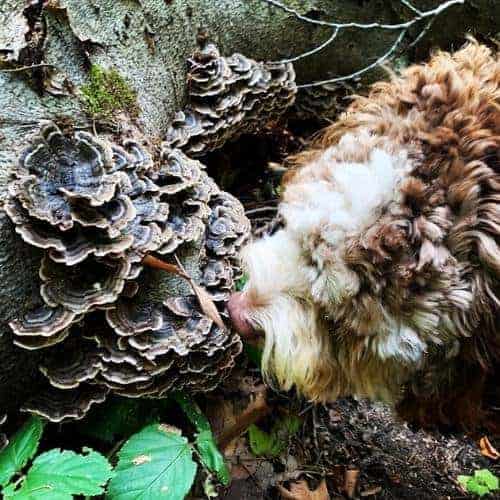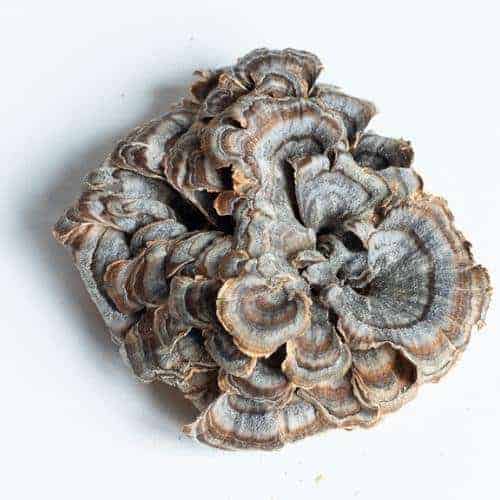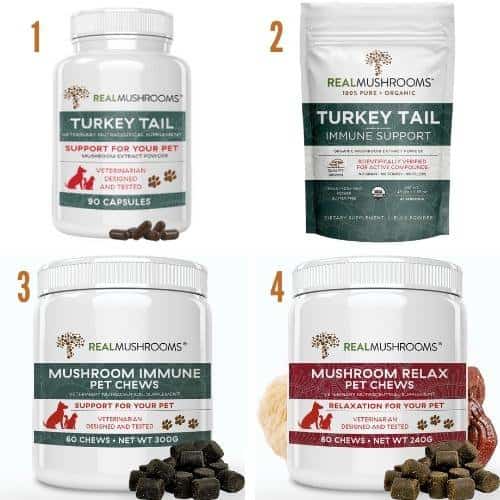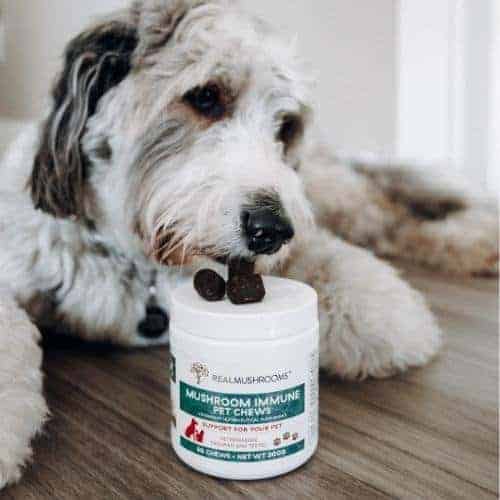Menu


Don’t be fooled by its name: there’s nothing fowl about the turkey tail mushroom.
In fact, this helpful fungus is abundant in compounds that can help keep your furry friend’s immune system strong and address other common canine health concerns.
This article dives into the many health benefits of turkey tail mushroom for dogs as a safe and versatile natural pet care supplement.
Read on to learn the multiple benefits of turkey tail mushrooms that modern studies have uncovered. We’ll also go over some frequently asked questions about administering turkey tail as a dog health supplement.
Note: This article was written by R.J. Silver DVM, MS, Chief Veterinary Officer for Real Mushrooms.
Turkey tail mushrooms (a.k.a. Trametes versicolor) have been used by humans for centuries to address various health complaints.
Turkey tail is known in traditional Chinese medicine as ‘yun zhi,’ which means cloud mushroom. It was used for its various health benefits, including boosting immune response, regulating digestion, and supporting lung and liver function.
Based on modern research and human studies, we have a greater understanding of the benefits of the turkey tail mushroom's many individual bioactive constituents.
Many veterinarians believe the same historical benefits and safety for humans will also translate to our pets’ health and wellness. However, there are only a few studies using the turkey tail mushroom in dogs to suggest its benefits objectively.
I will outline them in this article to suggest the possible applications of turkey tail extracts for dogs.

The turkey tail mushroom contains multiple different beta-glucans, which lead to various health benefits beyond a dog’s immune response.
Beta-glucans are a type of soluble fiber found in the cell walls of certain plants and fungi. They have been extensively studied for their capacity to help regulate the immune system, cholesterol levels, inflammatory responses, and blood sugar levels.
Each beta-glucan molecule in turkey tail is slightly different from the other. It is this multitude of similar but different beta-glucan molecules that gives turkey tail such robust immune enhancement properties.
Terpenes, both triterpenes and sesquiterpenes, are a second source of vital immune-enhancing compounds in turkey tail mushrooms. Terpenes have many beneficial effects, including boosting antioxidant activity.
Triterpenes in the turkey tail mushroom are, like the beta-glucans, found in various molecular variations. Each of these triterpene types has potent bioactivity against infectious agents and neoplastic cells.
Turkey tail’s cocktail of terpenes and beta-glucan molecules provides the therapeutic profile of immune effectiveness for which it is known.

Several studies have shown that giving turkey tail and its derivatives in the form of turkey tail mushroom products to your dogs can have plenty of health benefits. I’ve covered some key results of clinical studies performed on pets to showcase how effectively turkey tail mushrooms can support pet health.
The various “immune system-positive” compounds in turkey tail mushrooms are one reason they support a robust immune system response. This mushroom can address health challenges such as infections, immune deficiencies, and malignant cell growth in pets.
Several studies have explored the value of turkey tail mushrooms concerning various health conditions [1]. Some have focused on the antioxidant and inflammation-balancing effects of the bioactive molecules in this mushroom species.
One animal study found that the turkey tail mushroom could induce analgesia (mild pain relief). This effect is due to the ability of turkey tail polysaccharides to increase the cytokine IL-2, which can support inflammation response and, subsequently, reduce discomfort and mild pain [2].
Published studies in experimental animals also found a protective effect of turkey tail mushrooms on liver damage from alcohol [3]. This is relevant to dogs whose livers have been impacted by drugs such as steroids and chemotherapy agents.
In rat models, this mushroom also showed the ability to protect the heart from damage secondary to diabetes [4]. Turkey tail extracts have also been studied for their potential antimicrobial activity [5].
Further Studies: Although the reported health benefits of giving turkey tail mushroom to dogs are promising, studies and clinical trials are still being conducted today. Make sure to consult your veterinarian to confirm the mushroom product you want to give to your pets.
Historically, taking turkey tail mushrooms has been helpful in cancer treatment protocols in human beings. With respect to its mode of action (MOA) for fighting cancer, the turkey tail mushroom extract has a dual effect.
Turkey tail mobilizes the immune system to activate elements of the innate immune system to defeat microbial pathogens. Furthermore, turkey tail has a direct cytotoxic effect on these same pathogens [6].
There are two commercially-available products derived from turkey tail bio compounds from rigorous research: The Chinese and Japanese pharmaceutical industries have isolated polysaccharopeptide (PSP), and polysaccharide-Krestin (PSK) respectively.
Isolating and concentrating specific compounds in turkey tail mycelium produce these products. China and Japan have approved PSP and PSK, respectively, as drugs. While PSP and PSK are derived from mycelium, they are not at all similar to the turkey tail myceliated grain commonly found in North American mushroom supplements.
Both PSP and PSK have been used in Asia concurrently with chemotherapy for many decades. These have demonstrated benefits and safety for human patients with various cancer diagnoses.
One pilot study, published in 2012, gave a small number of dogs PSP. In the group given the highest dosage of PSP, the dogs with naturally occurring splenic cancer (hemangiosarcoma) had improved survival times [7].
A larger, prospective, randomized clinical trial has been recently published evaluating the benefit of PSP in a larger number of dogs with hemangiosarcoma [8]. This more recent study used the highest dosage (100 mg/kg), which was most successful in the previous pilot study. This trial compared the benefit of PSP alone or combined with doxorubicin chemotherapy in these dogs with naturally occurring hemangiosarcoma.
The results of the 2012 pilot trial were surprising and encouraging. The prolonged median survival time (MST) for the dosage level in this pilot study was 199 days!
The historical average for MST for dogs with hemangiosarcoma on doxorubicin chemotherapy was 141 to 179 days. The MST reported in a variety of studies for those dogs with hemangiosarcoma who do not receive chemotherapy, is 19-86 days.
Fewer than 10% survive for 12 months [9] [10] [11].
In the 2022 follow-up study, there was a significant difference in response to the PSP extract between male and female dogs. The first pilot study groups included mixed male and female dogs.
The response of the dogs was not evaluated based on sex. However, in the follow-up study, female dogs did not do as well as male dogs when they received either PSP alone or PSP and chemotherapy.
Interestingly, although the MST did not reach that very prolonged 199 days that the pilot study found, male dogs receiving the PSP alone did as well as the male dogs receiving chemotherapy alone. There was no measured benefit to the use of PSP together with chemotherapy for either males or females.
This study measured the immune-modulating ability of a single, isolated turkey tail molecule (PSP). However, the entire turkey tail mushroom extract, versus the pharmaceutical mycelial isolates of PSP or PSK, may have better effectiveness against cancer. This assumption is based on the fact that there is a wide variety of bioactive molecules in the whole mushroom.
Compared to the single isolates of PSP or PSK, an extract of whole turkey tail mushroom will have a full complement of molecules that work together synergistically to improve host immune function.
Both the PSP and PSK isolates have had good objective measured benefits in several human cancer diagnoses. Many studies have been published since the 1970-80’s when these extracts were developed.
The fact that isolates of turkey tail mushrooms showed the potential they did in extending the life of dogs with this aggressive cancer is very encouraging.
Did You Know: Hemangiosarcoma is a type of cancer found almost exclusively in dogs. It’s a very aggressive, toxic disease, rapidly progressing in most patients.
There are many situations where your pet could benefit from adding turkey tail mushroom extracts to its daily supplement program. This mushroom can, in particular, improve immune function and help resolve various problems.
Health issues such as chronic infections, especially those involving respiratory, skin or urinary issues, can be addressed with turkey tail extract. Used along with antibiotics, turkey tail extract can help further mobilize immune system activity. Therefore, certain conditions may respond better than with antibiotics alone.
Cancerous conditions are a complex problem; complex solutions are needed to support your pet’s immune system.
Like humans, pets need interventions that help to reduce the toxic effects of cancer growth and help them better withstand the rigors of conventional cancer therapies. Humans have used turkey tail safely for this purpose [12]. Therefore, animal application is the next field of inquiry.
Rabies is a fatal disease for animals and is zoonotic, meaning it can also infect people and be deadly for them. This is why vaccines are necessary to protect dogs and their owners.
A 2011 study examined whether turkey tail could help stressed, immunosuppressed shelter puppies achieve protective antibody levels from rabies vaccinations.
Most of the puppies in this study could not achieve a protective level of antibodies from their rabies vaccination alone. To condition their immune systems, the researchers gave the puppies a beta-glucan extract of oyster mushrooms for a month.
The immune-restorative benefits of the mushroom beta-glucans helped the puppies achieve protection from their re-vaccination for rabies [13]. The beta-glucans in turkey tail are an effective, natural way to improve immune system function.
The above study used a dosage of about 4 mg/kg daily of beta-glucans in these puppies. To help support your dog’s immune system with mushroom beta-glucans, you can give dogs an ongoing daily dose of turkey tail extract.
This is easily achievable with Real Mushrooms’ turkey tail mushroom extracts as follows:


Turkey tail (Trametes versicolor) mushrooms have been used by humans for thousands of years without evidence of any toxicity to the people who have used them. It then applies that turkey tail mushrooms are generally safe for dogs.
Anecdotally, turkey tail mushrooms have a long record of safety. It’s for this reason that objective safety and toxicity studies are rare in the world’s scientific literature on turkey tails and most other mushrooms.
One study, published in 2011, administered various doses and forms of the turkey tail mushroom hot water extract to laboratory rats. The researchers gave doses of up to 5000 mg/kg a day for 28 days.
Observations of rat mortality, impact on their behavior, adverse events, and relative organ weights were measured, and histological, hematological and biochemical measurements were taken. No remarkable adverse effects were observed in any of the rats who were administered turkey tail at any of the dose levels [14].
These findings confirm what has been observed for thousands of years, that the turkey tail extract did not cause any abnormal findings in any rat at any level of dosing.
A safety study for turkey tail that specifically tests high dosages of the mushroom in dogs as the target species, has yet to be conducted. Such a study is needed to ensure that the high dosage use of turkey tail mushrooms for dogs with serious problems, such as neoplasia and viral infections.
Cook Your Mushrooms: For dogs to receive the nutritional benefits of functional mushrooms, you need to ensure the mushrooms you choose are well-cooked. When edible mushrooms are fed raw to dogs, they might get an upset stomach due to trouble digesting the mushrooms.
Extracts of turkey tail mushrooms for dogs have become very popular since 2012. This is because a study was published that suggested that the turkey tail mycelial extract could improve outcomes for dogs suffering from hemangiosarcoma better than chemotherapy could [4].
Most of the turkey tail extracts available in North America are mycelium grown on grain. These products do not contain enough PSP isolate to have an effect.
Plus, you can’t separate the mycelium from the grain, which is very high in starch carbohydrates. It is known that cancer cells receive most of their nourishment for growth from carbohydrates. As a result, most cancer diet strategies suggest eliminating simple sugars and most carbohydrates.
However, not all turkey tail mushroom supplements are the same. This is why it's important to understand where the mushroom supplement you are considering giving to your dog came from, especially what it was grown on.
Many functional mushrooms grow in nature on dead and dying wood. Growing mushroom mycelium on grain is the next step in mushroom cultivation, not the last step.

Based on the information above, you should first find out whether the product you are looking to buy contains grains and mycelium or the whole mushroom. If you feed your dog a grain-free diet, why would you want to give your four-legged friend a mushroom supplement that was 50% grain and didn’t even have any actual mushrooms in it, only fungal mycelium?
In order for mushrooms to release their potency for use in health supplements, they need to be dried, ground-up finely, and then heated in near-boiling water for a period of time in order to rupture the tough fungal cell walls. This process is necessary to release the bioactive molecules found in the cell wall and inside the fungal cell.
Consuming just powdered dried mushrooms is less likely to have as much potency as mushrooms that have been hot-water extracted.
Real Mushrooms uses organically grown mushrooms grown on their native substrate: wood. No grains or mycelium are part of these products; they are 100% derived from the mushroom (fruiting body) and third-party analyzed for potency and purity.
The dried mushrooms are harvested at their highest potency and dried and ground into a powder that is then subjected to hot water extraction. This extraction process releases the potent molecules contained inside the fungal cells and cell walls. It is dried and powdered and then measured to contain the standardized amount of beta-glucans.
It’s this potent powder that is filled into capsules, compounded into soft chews or provided as the pure powder. This impeccable quality control guarantees your pet's safety so they receive consistency in our supplements’ potency.

If you are using Real Mushrooms turkey tail extract, you can expect more significant than 300 mg of beta-glucans per gram [15].
Approximately ½ teaspoon of this powder weighs about 1 gram = 1000 mg;
Daily Dosage Guidelines by Specific Purpose
Here are general guidelines for the administration of turkey tail extract under more medically serious conditions:
For these kinds of conditions, begin with administering a daily dosage as follows:
The answer to that question is–absolutely yes! Mushrooms are food. They are functional superfoods, actually. Turkey tail extracts work best when given daily with a balanced meal over a long period.
The longer you feed functional mushrooms to your dog, the better the results.
Mushrooms are super-functional foods that work slowly and naturally like all the other functional foods.
It's incorrect to assume mushrooms have immediate drug-like activity when we consider their immune-modulating capabilities. The immune system needs time and continued exposure to these immune-modulating beta-glucans and other molecules from mushrooms to modify its immune activity for the better.
Consistency of administration over extended periods is the best formula for success when using mushrooms medicinally for your pet.

Although mushroom-drug interactions have been reported, there are few reports where turkey tail is concerned.
Nonetheless, if your pet is on another strong medication from your vet, it's important that you ask that vet to check your dog’s blood levels to see if this mushroom is having an adverse effect on that medication level.
Adverse reactions to something new that hasn’t been given before are always possible. Allergic reactions tend to occur pretty quickly; toxicity may take hours.
This is why I think it's a good idea to start slow with a low “dose” just to be on the safe side. That seems to help with the transition for most doggies.
There are some reports of allergic reactions, even to tasty edible mushrooms like shiitake. Although these are uncommon occurrences, they are something to be aware of.
If there is a reaction you think is due to the mushroom ingestion, stop giving it and wait 24 hours to see if the reaction has gone away. If it hasn’t, call your vet and take your furry friend to the clinic to be safe.
Mushrooms are most effective when consumed daily with meals. They can be consumed once daily or multiple times to achieve the daily amount to consume for optimal benefits.
They don’t need to be given more than once daily. After more than six months of regular administration, you can give five days on and two days off or every other day if it makes your schedule more manageable.
Once you’ve built up momentum training your dog’s immune system by regularly administering mushroom extracts, you can begin lessening the number of days a week you give your dog this supplement.
The short answer is “never” for dogs that need health supplementation. This is especially true for older dogs that require maintenance medication and a stricter diet.
Mushrooms are meant to become part of your dog’s daily lifestyle if they are to play a major role in your four-legged family’s health maintenance program. This is also the case if you and your two-legged family members decide to use mushroom extracts for health maintenance.
Some areas where turkey tail mushrooms could help our canine friends are suggested by their well-studied properties. Therefore, extracts of this mushroom may be given to dogs for six general purposes:
To ensure your pet only gets quality products for their health, you can browse our products for 100% organic mushroom supplements fit for pets. Our turkey tail mushroom (fruiting body) extract supplements come in powder, capsule, and pet chews to match your furry friends’ preferences.

Disclaimer: The information or products mentioned in this article are provided as information resources only, and are not to be used or relied on to diagnose, treat, cure, or prevent any disease. This information does not create any patient-doctor relationship, and should not be used as a substitute for professional diagnosis and treatment. The information is intended for health care professionals only. The statements made in this article have not been evaluated by the Food and Drug Administration. Any products mentioned are not intended to diagnose, treat, cure, or prevent any disease. The information in this article is intended for educational purposes. The information is not intended to replace medical advice offered by licensed medical physicians. Please consult your doctor or health practitioner for any medical advice.

– Plus, Enjoy Exclusive Tips and Updates with Our Real Mushrooms for Pets Newsletter